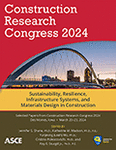An Exploratory Investigation of Social Vulnerability from the Building Resilience Perspective
This article has been corrected.
VIEW CORRECTIONPublication: Construction Research Congress 2024
ABSTRACT
Communities and cities are becoming vulnerable due to climate change-induced disasters such as heat waves, flooding, landslides, and droughts. The severity and increased frequency of these extreme events have demanded a resilience plan in the major cities to combat extreme weather events, which requires a systematic community vulnerability assessment. However, the specific impact of extreme events such as high heat waves on community vulnerability has been difficult to measure due to the unpredictability of weather patterns and events. Further, compounding the effects of building and built environment characteristics, the social and behavioral characteristics of households can result in differing levels of vulnerability to extreme temperature events. Even though many studies have discussed social vulnerability based on community demographics, the compounding effect has not been fully explored. When it comes to thermal resilience against extreme weather events, socially vulnerable communities are more likely to be affected by extreme heat due to a lack of thermal-resilient houses. In this research, Kolmogorov-Smirnov (KS-2 test) test was used to extend the relationship between building features data and the social vulnerability index of the city of Philadelphia. The outcome of this research strengthens our understanding of how social vulnerability and building resilience are correlated, also in the future to build community prototypes that integrate building features and social vulnerability to simulate community response against extreme weather events.
Get full access to this article
View all available purchase options and get full access to this chapter.
REFERENCES
Balogun, A.-L., D. Marks, R. Sharma, H. Shekhar, C. Balmes, D. Maheng, A. Arshad, and P. Salehi. 2020. “Assessing the Potentials of Digitalization as a Tool for Climate Change Adaptation and Sustainable Development in Urban Centres.” Sustain. Cities Soc., 53: 101888. https://doi.org/10.1016/j.scs.2019.101888.
Chen, C., et al. 2022. “Extreme events, energy security and equality through micro- and macro-levels: Concepts, challenges and methods.” Energy Res. Soc. Sci., 85: 102401. https://doi.org/10.1016/j.erss.2021.102401.
Coleman, N., A. Esmalian, and A. Mostafavi. 2020. “Equitable Resilience in Infrastructure Systems: Empirical Assessment of Disparities in Hardship Experiences of Vulnerable Populations during Service Disruptions.” Nat. Hazards Rev., 21 (4): 04020034. American Society of Civil Engineers. https://doi.org/10.1061/(ASCE)NH.1527-6996.0000401.
Dodge, Y. 2008. Kolmogorov–Smirnov Test; The Concise Encyclopedia of Statistics. Springer New York, 283–287.
Guardaro, M., D. M. Hondula, J. Ortiz, and C. L. Redman. 2022. “Adaptive capacity to extreme urban heat: The dynamics of differing narratives.” Clim. Risk Manag., 35: 100415. https://doi.org/10.1016/j.crm.2022.100415.
He, B.-J., J. Wang, J. Zhu, and J. Qi. 2022. “Beating the urban heat: Situation, background, impacts and the way forward in China.” Renew. Sustain. Energy Rev., 161: 112350. https://doi.org/10.1016/j.rser.2022.112350.
Omrany, H., A. Ghaffarianhoseini, A. Ghaffarianhoseini, K. Raahemifar, and J. Tookey. 2016. “Application of passive wall systems for improving the energy efficiency in buildings: A comprehensive review.” Renew. Sustain. Energy Rev., 62: 1252–1269. https://doi.org/10.1016/j.rser.2016.04.010.
“Resilience”. 2021. Accessed March 18, 2023. https://www.directives.doe.gov/terms_definitions/resilience.
Salimi, M., and S. G. Al-Ghamdi. 2020. “Climate change impacts on critical urban infrastructure and urban resiliency strategies for the Middle East.” Sustain. Cities Soc., 54: 101948. https://doi.org/10.1016/j.scs.2019.101948.
Shonkoff, S. B., R. Morello-Frosch, M. Pastor, and J. Sadd. 2011. “The climate gap: environmental health and equity implications of climate change and mitigation policies in California—a review of the literature.” Clim. Change, 109 (1): 485–503. https://doi.org/10.1007/s10584-011-0310-7.
“Social Vulnerability | National Risk Index.” n.d. Accessed March 18, 2023. https://hazards.fema.gov/nri/social-vulnerability.
Thomas, K., R. D. Hardy, H. Lazrus, M. Mendez, B. Orlove, I. Rivera-Collazo, J. T. Roberts, M. Rockman, B. P. Warner, and R. Winthrop. 2019. “Explaining differential vulnerability to climate change: A social science review.” WIREs Clim. Change, 10 (2): e565. https://doi.org/10.1002/wcc.565.
Ulrichs, M., R. Slater, and C. Costella. 2019. “Building resilience to climate risks through social protection: from individualised models to systemic transformation.” Disasters, 43 (S3): S368–S387. https://doi.org/10.1111/disa.12339.
“Zillow’s Transaction and Assessment Database” 2018. Accessed January 15, 2023. https://www.zillow.com/research/ztrax/.
Information & Authors
Information
Published In
History
Published online: Mar 18, 2024
Authors
Metrics & Citations
Metrics
Citations
Download citation
If you have the appropriate software installed, you can download article citation data to the citation manager of your choice. Simply select your manager software from the list below and click Download.
